|
Geography has never been my strong point. I opted out of it as a subject as soon as I could at school, and to this day would struggle to name more than half a dozen of the world's multitude of capital cities. Almost every year I go abroad on holiday, yet when asked about where I have been, I almost always struggle to pinpoint the exact location. I may be able to recall the country and the name of the town in which I stayed, but not region or the district in which it sits. What has this got to do with the disc under review here? Ah, well...
It's rare that you get to go into a film completely cold, knowing absolutely nothing about it, but such was the case with my first viewing of the intriguingly titled Sofia's Last Ambulance [Poslednata lineika na Sofia], released on UK DVD not so long ago by Second Run. I've had the review disc for some time but have been juggling more discs than I am able to cover, a situation exacerbated by a recent shortage of available reviewers and a day job that's been messing simultaneously with my head and my free time. But having cleared the reviews for upcoming releases (half of them delivered late), I figured it was time to start catching up on the discs I'd missed over the past couple of months, and this was one that sprang immediately to mind. It was all in that title, Sofia's Last Ambulance. What could it be? A drama? A comedy? Just who is this Sofia and just how many ambulances might she have ridden in before the arrival of this final vehicle? I was five minutes into the film before it occurred to me that I was not watching a minimalist art house drama but a documentary. A short while after this I became aware that Sofia was not the name of a woman but a place. And this is where my poor knowledge of geography let me down. It's not just a place, it's the capital city of Bulgaria and the location in which this film was shot. Ah... Time for a little research, methinks.
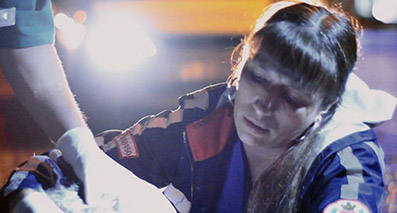
As befits its capital status, Sofia is the largest city in Bulgaria with a population of approximately 1.4 million people, and yet – and I still have trouble processing this astonishing fact – it only has 13 ambulances. Think about that for a second. That's one ambulance for every 107,692 people. To give you a comparative figure, London has a population of approximately 8.3 million people, but around 900 ambulances operating from 70 ambulance stations dotted throughout the city. That's 1 ambulance for every 9,222 people. But the London Ambulance Service also has around 100 rapid response units (a mix of cars, motorbikes and even pedal cycles) and regularly calls on the assistance of a helicopter operated by the London Air Ambulance. Bit of a difference, huh?
So Sofia's Last Ambulance is a Bulgarian 999 then? Far from it. Following a single ambulance over the course of one shift (well not exactly, but I'll get to that in a minute), the film focuses exclusively on the seemingly eclectic three person crew consisting of white-haired doctor Krassi Yordanov, plain-speaking nurse Mila Mikhailova, and good looking young driver Plamen Slavkov. And when I say it focuses exclusively on them I mean just that, as while we do follow Krassi and Mila when they enter premises to which they've been directed, their patients are never clearly shown (you'll be particularly glad of this when the crew discover a body whose face has been partially eaten by worms). Indeed, for much of the running time the dashboard mounted cameras are framed on the individual faces of the three occupants of the ambulance as they drive to the next job, wait for another call, or in rare quieter moments just sit and talk to each other.
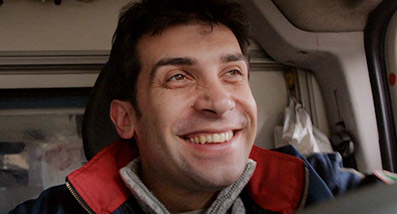
This may sound like cinematically and even dramatically dull stuff, but like the taxi passengers in Abbas Kiarostami's 10 (to which comparisons have inevitably been drawn),* this approach focuses your attention on the reactions and emotions of the individuals under photographic scrutiny. This is at its most effective when the gaze of the cameras – which the crew have become so used to that they no longer seem aware of their presence – is held long enough for us to register and appreciate the sadness, frustration and weariness that hovers beneath their otherwise cheerful and resolute surfaces, as well as the humanity that draws them back each day to fight what we can presume are the same old battles. Occasionally, this approach delivers a degree of character humour, as with Mila's comical shrink-in-the-seat terror at the unflappable Plamen's driving, or the sequence in which the crew become lost in darkened suburbs. It also provides an occasional peek into the talkative Mila's home life, as when she calls her young daughter to coo a goodnight message that the nature of her job prevents her from delivering in person, inviting us to connect the dots about Mila's domestic situation by linking it to earlier remarks about the poor state of her love life and her financial difficulties. The private lives of her two male colleagues, by comparison, remain a largely closed book, although Krassi's frustration at the failings of the system to which he is nonetheless dedicated becomes increasingly evident as the film progresses.
We may not actually get to know Mila, Krassi and Plamen on a personal level, but by hanging out with them in such an intimate manner we are left with the very real impression that we have, and by so effectively bonding us to them, director Ilian Metev makes us almost feel part of the ambulance crew. It thus becomes easy to share the crew's agitation when radio communication with headquarters falters, or to share their alarm at how long it has taken for a reported call-out to be passed onto them – that the dispatcher then sternly questions their surprise tells a tale in itself, and this delay is later shown to have had serious consequences. We are left with the unshakable impression that the city and its emergency health care system are both in need of a serious overhaul. Nowhere is this more vividly captured than in the fast runs to hospital, when the camera is in the back of the ambulance with Mila as the ageing vehicle is violently and noisily shaken by roads that are liberally peppered with potholes.
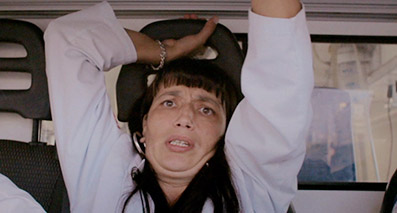
A few might balk at the news that what appears to play out as a single shift was actually assembled from footage recorded over the course of two years, but I'm having none of it. The timespan of the average shift gives the film its (admittedly constructed) narrative arc, and the encounters have been carefully selected and ordered to provide a representative portrait of the range of issues that the ambulance crews face. The quieter moments, meanwhile, have been chosen and positioned within the timeline for the insightful portrait they paint of the three protagonists and a system that is teetering on the verge of collapse. It's a consistently captivating and enlightening work, and by sidestepping the sensationalism and audience-grabbing dramatics that seem endemic to the emergency response sub-genre, Sofia's Last Ambulance gets us closer to its trio of dedicated medical professionals than all of their multitude of televisual forebears combined.
Sofia's Last Ambulance was shot digitally on what we can presume were DSLRs and/or GoPros in a variety of lighting conditions, from daylight and the low light gloom of the ambulance cab at night. With that in mind, and that fact that this is a DVD rather than a Blu-ray, the image and transfer quality are both excellent, boasting a solid level of detail – when the narrow depth of field that is endemic to DSLRs allows – and a very decent contrast range and lifelike colour. The framing is 1.85:1 and the transfer has been anamorphically enhanced.
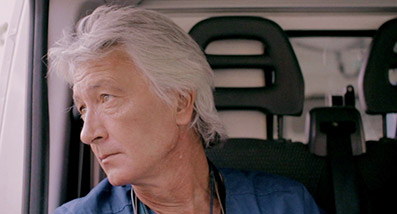
The Dolby 2.0 stereo soundtrack is of similarly impressive quality, with clear recording of voices (all three of the crew wore radio mics) and a strong dynamic range that delivers some punchy bass and a crispness and clarity to background sound (the traffic on the roadside incident is a good example) that captures the atmosphere of the location without ever overwhelming the dialogue.
In Conversation with the Director (17:13)
Young Bulgarian director Ilian Metev is interviewed by the film's British sound recordist Tom Kirk (the pair effectively functioned as a two-person crew with Metev on camera) about how the film came about, the selection of the ambulance crew, the decision to focus exclusively on the medical staff and not film the patients, how the film's structure took shape, and its reception at Cannes. Kirk, meanwhile, provides some useful technical details and assures his director that he had complete faith in the project from an early stage. Really interesting stuff, though those filming the interview probably learned a couple of things about the perils of shooting against a highly reflective window...
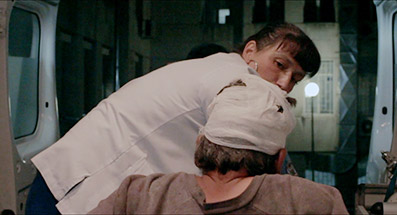
Goleshovo – a short film by Ilian Metev (34:35)
What may well have been Metev's final major project during his time at Britain's National Film and Television School is a virtually narrative free observational documentary, one that paints a beguiling portrait of the Bulgarian town of Goleshovo, which has a population of just 59, all of whom appear to be in their 70s or older. Essentially made up of small snippets of everyday life within the town, like the main feature it lives through its characters, from the delightfully spirited 82-year-old who recalls her wonder at first visiting another town, to the couple who struggle to load goods onto a donkey, aided by a mother who looks no older than either of them. Gorgeously shot by Metev himself, it was written by Betina Ip, with whom Metev later founded Chaconna Films, whose first feature production was Sofia's Last Ambulance, on which Ip was co-editor.
Booklet
An informative booklet that contains some intriguing reflections on the production of the film by its editor Betina Ip, a brief interview with Ilian Metev conducted at the 2012 Cannes Film Festival, at which the film was screened, credits and stills.
It will doubtless be argued that Sofia's Last Ambulance requires some patience on the part of the viewer, but if you're on this site and reading this review then I'm guessing that's already part of your film appreciation make-up (and if not, it should be). For my own part I became hooked in the first ten minutes by the intimacy of Metev's approach, the unusual rhythms of Metev and Betina Ip's editing, the diverse personalities of the ambulance crew, and the fact that I seemed to be learning so much about them and their country's health system without being told anything directly. It's an oddly compelling work that deserves to be seen, and is very well served by Second Run's fine DVD. Warmly recommended.
* The link to Kiarostami is established from the off by the opening through-the-windscreen shot that delivers the crew to their first job, a signature image from Kiarostami's cinema.
|